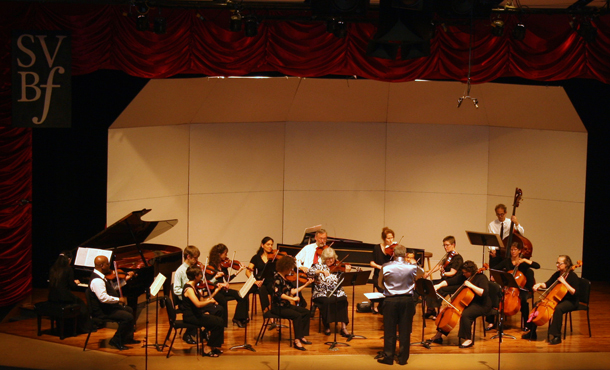When violinist Mark Hartman was invited to join the first Shenandoah Valley Bach Festival orchestra 21 years ago, he never thought he’d come back every single year. In fact there was a time when he wasn’t sure he could make a living as a violin player.
When this year’s festival orchestra, made up of 63 professional musicians from a dozen states, gathered June 9-16 at Eastern Mennonite University (EMU) in Harrisonburg, Va., it was like a family reunion. The musicians keep coming back. “This festival operates on the loyalty principle,” said Hartman.
The festival musicians are “crazy busy,” he said, as they get ready to perform the first Sunday afternoon and then three times the next weekend. Some of them play in smaller groupings at one of the noon concerts during the week in downtown Harrisonburg. Hartman joined a cellist and pianist on Monday to perform a contemporary piece by Paquito D’Rivera.
Hartman played in rock bands during his growing-up years. After he discovered the violin he went on to earn a college degree in violin at the North Carolina School of the Arts.
This year’s festival opened with five concertos presented in the 17th-century Baroque style, with a smaller orchestra and most of the members standing. Kenneth J. Nafziger, founder, artistic director, and conductor of the Bach Festival, explained to the audience what was going on. The first piece, by Arcangelo Corelli, was performed by a core of three featured musicians surrounded by 12 others. There was no conductor. “This is the simplest visual presentation of a concerto,” said Nafziger, who is a longtime EMU music professor. “It’s interactive, like watching a tennis match.”
Each year the festival features the music of Johann Sebastian Bach, the prolific 18th-century German composer, along with one or two others. This year the others were 19th-century composer Giuseppe Verdi of Italy and 20th-century composer Benjamin Britten of England.
The second major concert at this year’s festival featured seven popular arias from Verdi’s operas, sung by this year’s internationally known soloists – soprano Veronica Chapman-Smith, tenor Kenneth Gayle, mezzo-soprano Heidi Kurtz, and baritone Grant Youngblood. The concert also included Bach’s Brandenburg Concerto No. 1 and Britten’s “Four Sea Interludes” from the opera Peter Grimes, which was first performed in the newly re-opened opera house of London after World War II.
Festival Concert 3 was devoted entirely to Verdi’s Requiem, his masterpiece that premiered in Milan in 1874. The full orchestra and featured soloists were joined on the crowded stage by a choir of 88 volunteer singers from near and far. Mary Kay Adams, a flutist and EMU music professor who is the festival’s executive director, said Verdi’s Requiem may have drawn the biggest crowd to Lehman Auditorium in the Bach Festival’s history.
The noon chamber concerts during the week, held at historic Asbury United Methodist Church, included child-prodigy flutist Emma Resmini, pianist Naoko Takao, old Broadway show tunes, Dixieland jazz, organist Marvin Mills, and the premiere performance of Gwyneth Walker’s The Peacemakers.
The festival concluded on Sunday morning, as always, with a worship service patterned after the services that Bach led for 27 years at St. Thomas Church. His duties as cantor and organist included the ambitious – almost unbelievable − task of composing a cantata every week that illustrated the gospel reading of the day. This also meant that Bach had to prepare copies of music by hand and rehearse the musicians.
The gospel reading at the Bach Festival this year was Luke 5: 1-11, where Jesus called fishermen to leave their nets and join him as disciples. The orchestra and vocal soloists performed a Bach cantata on the subject, and the homily was delivered by Isaac Villegas, pastor of Chapel Hill Mennonite Fellowship in North Carolina.
Then the tired musicians returned home.
How do classical musicians – especially the members of the orchestra − make a living?
Hartman is typical of the musician who earns graduate degrees in his instrument and then struggles to pay his bills through music. One of his professors helped him prepare for a big break − auditioning successfully for the Winston-Salem and Greensboro symphonies in North Carolina.
But playing in small-city orchestras is not usually enough. So Hartman initially gave violin and guitar lessons and sought gigs as a solo player or as part of an ensemble.
Like many other musicians, though, Hartman found a more stable career at age 40 when he obtained a college teaching position. Today he is the orchestra director at Shippensburg University in Pennsylvania.
He plans to be back in 2014 for the Bach Festival, when – among other things – the festival welcomes Canadian soloist Daniel Lichti for an encore performance of Felix Mendelssohn’s Elijah.
